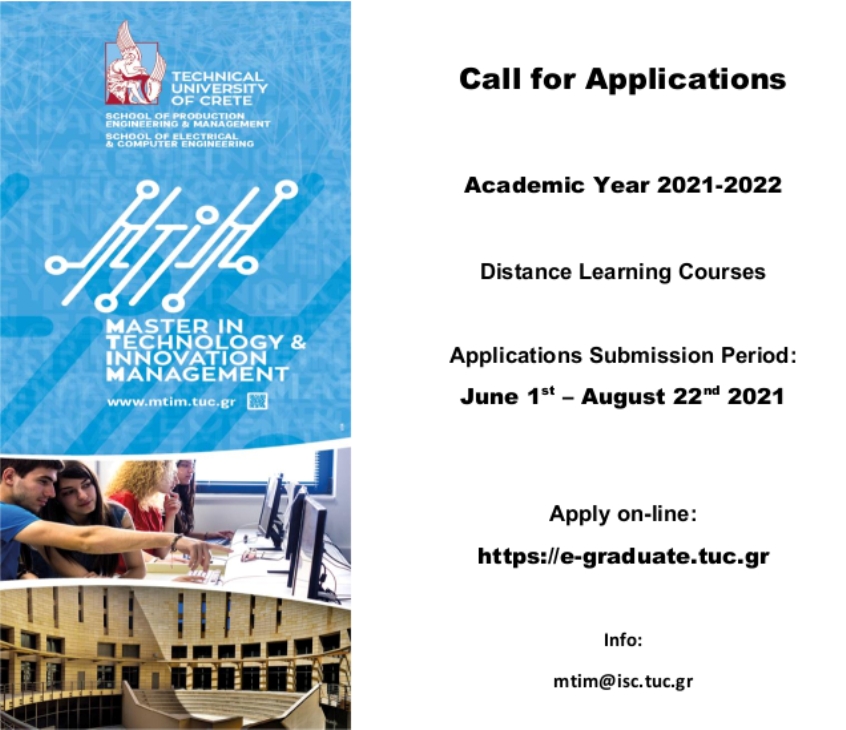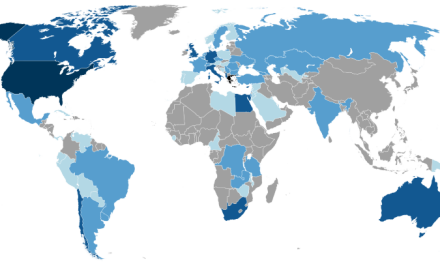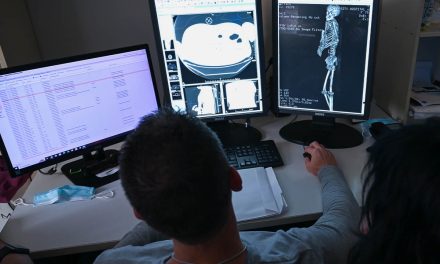The web portal Study in Greece is campaigning for the promotion and international visibility of Greek Universities and the comparative educational advantages of our country. In particular, the campaign focuses on the foreign language study programs that Greek Universities offer to Greek and international students. The initiative is supported by the General Secretariat of Higher Education of the Ministry of Education and Religious Affairs and the General Secretariat for Greeks Abroad and Public Diplomacy of the Ministry for Foreign Affairs. In this context, a number of educational programs and actions are presented in detail on a regular basis, such as undergraduate and postgraduate programs, summer schools etc, to inform international students about the many foreign language options offered by Greek Universities. Study in Greece talked with Professor Nikolaos Matsatsinis about the Master’s in Technology & Innovation Management offered by the Technical University of Crete and what it has to offer to foreign students.
Nikolaos Matsatsinis is Professor of Information and Decision Support Systems in the School of Production Engineering and Management of the Technical University of Crete, Greece. He is Director of Decision Support Systems Lab and former President of the Hellenic Operational Research Society (HELORS). He has contributed as a scientific or project coordinator to over fifty national and international projects. He is chief editor of “Operational Research: An International Journal” and “International Journal of Decision Support Systems” and a member of the international advisory board of three scientific journals. He is the author or co-author of twenty-one (21) books and over of hundred (100) articles in international scientific journals and books. He has organized and participated as a member in scientific or program committees of over eighty (80) scientific conferences and has over one hundred and eighty (180) presentations in international and national scientific conferences. His research interests fall into the areas of Intelligent Decision Support Systems, Recommendation Systems, Multicriteria Decision Analysis, Group Decision Making, Operational Research, Marketing, Consumer Behavior Analysis, New Product Development, Electronic Business, Business Intelligence & Analytics, Systems Engineering, Healthcare Services, Evaluation methods.
 Could you please tell us about the content, rationale and objectives of the Master’s Technology & Innovation Management?
Could you please tell us about the content, rationale and objectives of the Master’s Technology & Innovation Management?
MTIM is an interdisciplinary MSc program offered by the Technical University of Crete and it’s coordinated by the School of Production Engineering and Management with the collaboration of the School of Electrical and Computer Engineering. The MTIM Postgraduate Program leads to a Master of Science (MSc) degree in ‘Technology and Innovation Management’. The Program has been designed around the special issues of Management Technology & Innovation. The units are structured to provide strong and coherent training.
The program’s duration is either 12 months (full-time) or 24 months (part-time).
The full-time graduate program comprises:
- Two semesters 13 weeks each, with course-work on a full-time basis (60 ECTS). Formal examinations are conducted after each semester, and
- Following the successful completion of their exams, the students will have a 3-month period to prepare their master’s thesis (15 ECTS).
The course consists of three main components:
- Lectures
- Laboratory exercises
- Computer exercises
These take place during a two-semester period (13 weeks each).
The Master’s in Technology & Innovation Management (MTIM) program builds upon the technical strengths of engineers and scientists by providing them with skills and knowledge to manage technology and innovation within their organizations. The MTIM program is suitable for those working both in the public or private sector.
The program is taught in English and courses are offered through an eLearning platform.
The MTIM program is designed for graduates from a wide range of academic backgrounds, including Engineering Schools, Physics, Mathematics, Chemistry, Biology, Geology, Agriculture, Business Administration, Finance, Information Technology, Medical & Bio-medical, Military Academies and Technological Universities & Institutes from EU and non-EU countries.
 Given that the program is taught in English, is this an effort that goes hand in hand with the internationalization of Greek universities?
Given that the program is taught in English, is this an effort that goes hand in hand with the internationalization of Greek universities?
It certainly contributes to the more generalized effort of drawing attention to the higher educational capabilities offered by the Greek Universities, whilst at the same time it upgrades our graduates’ potential of succeeding within a globalized working environment.
What has been the program’s output so far? Is it satisfactory?
MTIM postgraduates are succeeding in the most contemporary, developing and competitive corporation fields, which include start-ups and innovation projects in Greece and abroad. Furthermore, postgraduates with high academic vision and perspective are entitled to advancing their studies to a PhD and Post-PhD level.
 Considering that technology and innovation are key drivers of competitive advantage in today’s knowledge economy, is this a reason for both Greek and foreign students to choose your program?
Considering that technology and innovation are key drivers of competitive advantage in today’s knowledge economy, is this a reason for both Greek and foreign students to choose your program?
Technology and innovation management education has been around for over 30 years. It has continuously been regarded as a critical and vital area for professional and executive development in different countries that can effectively support economic development and growth. The MTIM Program offers exactly that to both Greek and foreign postgraduate students. These students can form a developing core whose practice can divert the current challenging times, through socio-economic development in terms of productivity, employment and competitive position. This should be a drive for all candidates who are inclined towards linking business and technology in order to cater for the growing needs of the industry and society in general.
 Why should an international student choose this Master’s program, Chania and Crete in general as a study destination?
Why should an international student choose this Master’s program, Chania and Crete in general as a study destination?
According to the updated assessment list 2021-22 conducted by the Center for World University Rankings (CWUR), the Technical University of Crete holds 1,713th place on the World Rank and the 1,640th place on the Research Performance Rank. Highly experienced teaching personnel holding global distinctions, provide academic excellence.
Since 1984, the School of Production Engineering and Management graduates, often within challenging circumstances, has been able to professionally implement the multidisciplinary facets of education it has provided. PEM’s graduates are employed and excel in both the private and public sector in the areas of construction, industry, services, education, and as self-employed engineers. The faculty, distinguished in both teaching and research, is recognized worldwide. In conjunction with highly qualified and skilled laboratory personnel, PEM emphasizes on modern technologies, production systems, management and decision making, finance, operational research as well as ergonomic design, control systems, materials, mechatronics and robotics. The foundation of PEM’s curriculum is based on mathematics, physics, mechanics and informatics, whilst it provides both a comprehensive engineering education but also allows a focus on specific areas in Production Engineering and Management, valuing and pursuing ongoing development.
As regards the School of Electrical and Computer Engineering, it is historically the second technical school founded in Greece to cover the needs of the country’s industry in engineers thoroughly trained and with a strong background in Computer Engineering. The field of ECE covers a broad range of activities and our graduates are employed as middle and high-level managers in the entire spectrum of design and production stages in industry, government consulting firms, high-technology agencies, and also as consultants in areas, such as the design and development of Information, Telecommunication, Electrical, Electronic, Automatic Control, and Energy Systems.
As far as Chania and Crete are concerned, Chania lies on the north coast of the island of Crete and it’s the second-largest city of the island as well as the capital of the Chania Prefecture. It is one of the major tourist destinations in Greece, with its many beautiful beaches, the high peaks of its White Mountains and its characteristic deep gorges, such as the Samaria Gorge. Chania’s rich and multifaceted history goes back to the Minoan times when it was a settlement known by the name of “Kydonia”, a Greek word for quince. As one of the oldest cities in Crete, archaeological evidence of the presence of Dorian Greeks, Romans, Byzantines, Venetians and Ottomans can be found all over the city area. Chania is considered one of the most beautiful and lively destinations in Greece, with its well-preserved traditional architecture and monuments from Venetian and Ottoman times. The old Venetian harbor, with the distinctive lighthouse, and the old town have bestowed Chania the reputation of the most picturesque city in Crete, welcoming thousands of visitors each year.
Chania does not lag behind in modern developments, as it is home to the Technical University of Crete, as well as other educational institutions. It also offers many and varied cultural events and amusements.
The campus is undoubtedly the heart of TUC! Students, professors, lab technicians, administrative employees, all meet on campus on a daily basis. The campus is located on a panoramic site on the peninsula of Akrotiri and covers an area of 750 acres, 5.5 km northeast of Chania. It includes the University Hall of Residences, the University Restaurant and Cafeterias, the Schools’ Secretariats, the Library, the Information Systems Centre, the Network Operation Centre, the Public & International Relations Department, the Career Services Office, the Technical Services, classrooms, lecture halls and laboratories as well as faculty and graduate students offices.
Common reference points of all students are the Library and Information Centre, the Language Centre the IT & Communications Centre, the Hall of Residences, the University Restaurant and Cafeterias as well as the Sports Facilities, whilst numerous student groups, set the tone on campus.
 Tell us a few things about the Technical University of Crete – its history, its departments, its facilities, the scientific disciplines and the research carried out by the university.
Tell us a few things about the Technical University of Crete – its history, its departments, its facilities, the scientific disciplines and the research carried out by the university.
The Technical University of Crete was established by Law according to the Official Government Gazette No. 545/77 of 17/02/1977, on the “Establishment of a Technological Institution under the title Technical University of Crete and other provisions”. The main task of the first Executive Committee in 1977 was to find a venue for the construction of permanent university facilities by commencing the expropriation procedure of 350 hectares of land. It is worth mentioning, at this point, the immense support of the local community on this matter. The foundation ceremony of the university facilities in Akrotiri took place in December 1988.
In 1984, the first faculty members were appointed. During the academic year 1984-85, the Production Engineering and Management Department, together with the Sciences Department, began running its educational program and admitted its first 120 students,. The Mineral Resources Engineering Department followed in 1987-88 and the Electronics and Computer Engineering Department in 1990-91. Later on, and after the University had become independent, the Chemical Engineering Department became an Environmental Engineering Department and admitted its first students in 1997. Finally, in 2004 the Architectural Engineering Department was established and welcomed its first students. In 1993, all the necessary legal requirements were met and thus all the Departments of the University became independent and have been operating since with elected governing bodies.
Since then, the Technical University of Crete has been making continuous and significant progress. The high quality of the faculty staff, the scientific partners and the administrative and technical personnel guarantee the University’s future growth. The campus is certainly one of the best in Greece, with modern lecture halls and research facilities, library, student halls of residence, restaurant and recreational areas. New Departments are scheduled for the future and at the same time, the contribution of the Technical University of Crete in research is broadly appreciated, as the Institution is now recognized as one of the most prestigious research institutions in Greece with hundreds of research programs in progress. The Technical University of Crete is now recognized both as an educational and research institution in Greece and internationally and can therefore look to the future with great optimism.
 Ιn your opinion, how does this master’s program contribute to the economic and cultural life of the city of Chania?
Ιn your opinion, how does this master’s program contribute to the economic and cultural life of the city of Chania?
The international identity of the program favors both interaction and awareness amongst its students, their cultures and socioeconomic background. Crete’s unique civilization is being spread globally through its current research fields and practices, along with the determining contribution of Professors, assistants, start-up specialists and students from Universities and research centers from around the world.
Postgraduates of the MTIM program gradually shape the development of the hosting city of Chania, by applying their knowledge and asserting distinction through functional ideas and start-ups. The Program aspires to turn Chania into an outstanding innovation centre, positively contributing to both social and economic life of this vivid city.
The application submission period expires on August 22, 2021. For more information visit the Master’s site: https://www.mtim.tuc.gr/en/home
F.K.














